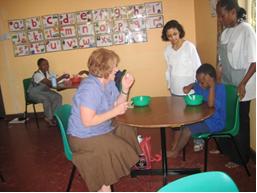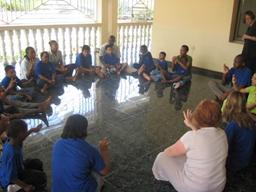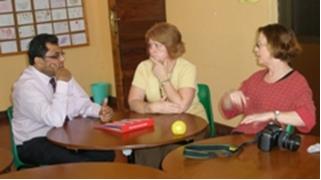Updated 25 August 2009
Kari Dunn Buron who is an Autism Education Specialist in Hamline University in USA together with her colleague Joyce Santo visited the World Federation Autistic Daycare Centre in Dar-es-Salaam, Tanzania in May 2008.
Kari Dunn Buron has been working with students with autism for over 33 years, having only recently retired she has had an illustrious career. She is the designer and coordinator of the autism spectrum disorders certificate program at Hamline University in St. Paul. She is also the co-author of the bestseller ‘The Incredible 5-Point scale’ aside being a founding member of the MN Autism Network.
Kari has done volunteer work in Trinidad, West Indies since 1991, giving classes on autism to parents and helping to set up schools, which has been of significant advantage and benefit to the World Federation autistic centre, as she conveyed crucial advice and training exercises from her substantial experiences.

Joyce Santo busy with kids

Kari, Joyce, Teachers & Children in session

Dr Z. Abbas, Joyce Santo & Kari Dunn Buron in discussion
The World Federation, Assistant Secretary General-Health, Dr Munir M Datoo said 'It is so pleasing to see that a renowned educationalist and specialist like Kari Dunn Baron had taken time and effort out of her busy schedule to travel to Tanzania and not only train the staff at the World Federation Autistic Day Care Centre, but also made an impact and lasting impression on the young children as well. I hope that Kari found the experience rewarding and she will act as an advocate for the WFADCC and assist in more training opportunities'
Following is her report on the centre. To view the report online, click here
Our Visit to the Autistic Daycare Centre Dar es Salaam, Tanzania
Our experience in Tanzania began when Maureen Bennie of the Autism Awareness Centre in Canada asked me if I would be interested in traveling to Dar es Salaam to work in a school for children with autism. I have a background in volunteerism and spend a week every year in Trinidad and Tobago West Indies where I work with a group of parents through the Autistic Society of Trinidad and Tobago. I agreed without hesitation and suggested that my formidable colleague, Joyce Santo, go too. Joyce has worked with me in Trinidad and the two of us bring unique and needed skills and information to the training table.
When Joyce and I arrived at the school, we were immediately impressed by the welcoming nature of the building itself. We could tell right away that the teachers were well trained. The entire staff greeted us warmly and appeared eager to learn new things.
The school facility includes a well equipped and secure playground, a state of the art sensory room, a kitchen and eating area, 3 main classrooms and other small work spaces. Since our goal was to teach the staff about visually structured environments, we knew right away that we would have a receptive group.
Meeting the children was the highlight. We spent the first day just playing with all the children, observing them and getting to know them. The school staff was gentle and nurturing in their interactions with the children. The children obviously loved being at school and we could tell that they felt comfortable in the school environment.
We decided to focus on the 5 children who were diagnosed with an autism spectrum disorder. We developed visual schedules for each of the 5 children. Visual schedules help to increase independent movement for dependent children. We taught the teachers how to teach the children to follow and use the schedules. The schedules were a great success and within two days, the children were already catching on to their use!
Another strategy we introduced was the use of predictable visual routines throughout the day. We created 3 to begin using including an entry/exit routine for children to “check-in” and “check-out” of school each day. We added visuals to the singing group to make it more routinized. We created a choice board so that nonverbal children could choose songs and added name cards to prompt the children to learn and use names.
The first week also included training and practice on the use of the Picture Exchange Communication System (PECS). Although the staff had heard of this strategy before, they had not yet implemented as a part of their program.
Throughout our first week, we held daily training sessions for the staff and it was during these sessions that we were able to create the materials needed to visually support the school environment and to set up the PECS program. Each day we discussed what we had worked on that day, the educational reasoning behind the strategies and the plans for the following day. The teaching staff received extensive training and practice in the PECS approach.
The second week was spent practicing the use of schedules, visual routines and PECS training. We also introduced the idea of “Functional Work”. This training helps teachers to create work that leads to functional and long term goals for both independent living and work skills. The staff spent many hours creating work tasks to use with the students. They really pulled through on this task, displaying their remarkable creativity!
The experience was judged to be beneficial for everyone involved, including Joyce and myself. This experience could not have happened without the support of the Autism Awareness Centre, The World Federation, and the Autism Asperger Publishing Company. We participated in an Autism Awareness Day before our departure. There were several special education teachers in attendance and everyone mentioned the need for teachers to begin networking and sharing and learning from each other. The World Federation Autistic Daycare Centre is in a unique position to truly be a leader in such training efforts.
Kari Dunn Buron
Autism Education Specialist
Hamline University
St. Paul, MN USA
For more information, please contact health@world-federation.org